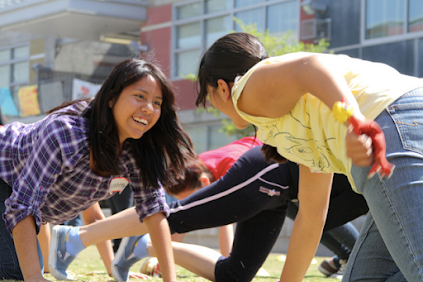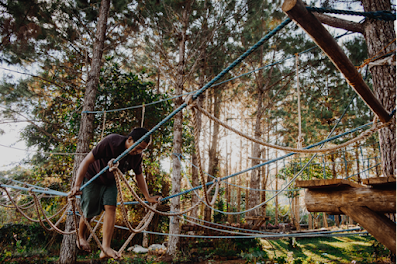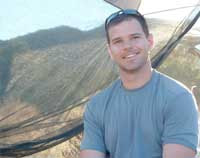 |
| Source: Akoma Unity Center |
Research tells us that young people’s connection to the outdoors and nature contributes to their healthy development. This connection can be promoted by involving youth in gardening. We will post several LIAS Blogs on the topic of gardening in afterschool. Below we offer a guest blog from Akoma Unity Center on their community garden project. (Note: Our series of blog posts on gardening in afterschool are excerpts from a larger briefing paper entitled, Gardening in Afterschool Programs.)
Growing Together: Cultivating Inclusivity in Our Community Garden
By Guest blogger Akoma Unity Center. (This blog was originally published on Akoma Unity Center.)
Introduction
In a fast-paced world, finding a tranquil oasis where individuals of all ages and backgrounds can come together and connect with nature is a rare gem. Our community garden, nestled in the heart of the city, is precisely that and so much more. Beyond being a sanctuary for plant enthusiasts, it is a thriving hub that celebrates diversity, fosters collaboration, and cherishes the spirit of shared learning. In this blog post, we invite you to explore how our community garden has blossomed into a truly inclusive space, embracing everyone, regardless of their age, background, or gardening experience.
Cultivating Diversity
Step foot into our community garden, and you’ll witness a vibrant tapestry of faces and stories from various walks of life. We take immense pride in providing an open-armed welcome to individuals of all ages, backgrounds, and levels of gardening expertise. Whether you’re a seasoned gardener or a complete novice, you’ll find yourself embraced by a warm and supportive community.
 |
| Source: Akoma Unity Center |
The Power of Collaboration
At the heart of our community garden lies the essence of collaboration. Here, gardeners don’t just tend to their own plots; they work together, exchange ideas, and lend a helping hand. It’s a place where experienced green thumbs generously share their knowledge with beginners, fostering an environment of growth and camaraderie. Through joint efforts, we not only cultivate beautiful blooms and delicious produce but also cultivate lasting friendships.
Respect and Understanding
Respect is the cornerstone of our garden’s culture. We celebrate the uniqueness of each individual, understanding that our diverse backgrounds enrich our collective experience. Here, conversations flow freely, and perspectives are exchanged with an open mind. We learn from one another, breaking down barriers and building bridges of understanding that transcend age, culture, and language.
 |
| Source: Akoma Unity Center |
Learning Together
Our community garden is more than just a place to dig in the dirt; it’s a haven of continuous learning. Seasoned horticulturists share their wisdom through workshops and tutorials, while young enthusiasts infuse the space with fresh ideas and innovations. Together, we explore sustainable gardening practices, experiment with new crops, and embrace the ever-evolving world of horticulture.
An Inclusive Space for All
As the sun sets behind the horizon, casting a golden glow on our bountiful garden, the sense of belonging is palpable. Children play, elders share stories, and friendships blossom across generations. Our community garden is a testament to the power of inclusivity, where the simple act of planting seeds cultivates a sense of togetherness.
Conclusion
Our community garden stands as a living testament to the beauty of embracing diversity and nurturing an inclusive space. It is a place where laughter reverberates, friendships flourish, and a shared passion for nature unites us all. As we invite you to step into this blossoming sanctuary, we extend an open invitation to everyone, welcoming you to become a part of our green family. Together, let’s continue sowing the seeds of inclusivity, respect, and shared learning in the fertile soil of our community garden.
MORE ABOUT…
Akoma Unity Center (AUC) is a 501 (c)(3) non-profit, grassroots organization committed to the progress of African American youth, families, and communities. Akoma’s programs and services are specifically designed to meet the needs of historically excluded African American youth and communities. Programs include; Afterschool Program, Summer Day Camp, SOUL FOOD Community Dinner Night, male mentoring program, Rites of Passage, Advocacy for youth of color, STEAM Fair- Back to School Giveaway and Toy/Coat giveaway.At Akoma Unity Center, the unwavering mission is to educate, heal, and transform historically excluded communities of Black, Indigenous, and People of Color (BIPOC). They are dedicated to creating a more equitable and just society by organizing individuals, cultivating healthy families, and empowering communities to overcome systemic barriers. Through their comprehensive programs and initiatives, they strive to foster holistic healing, educational empowerment, and economic opportunities. By addressing the unique challenges faced by BIPOC communities, they aim to dismantle inequities, uplift voices, and create sustainable change.












.JPG)













